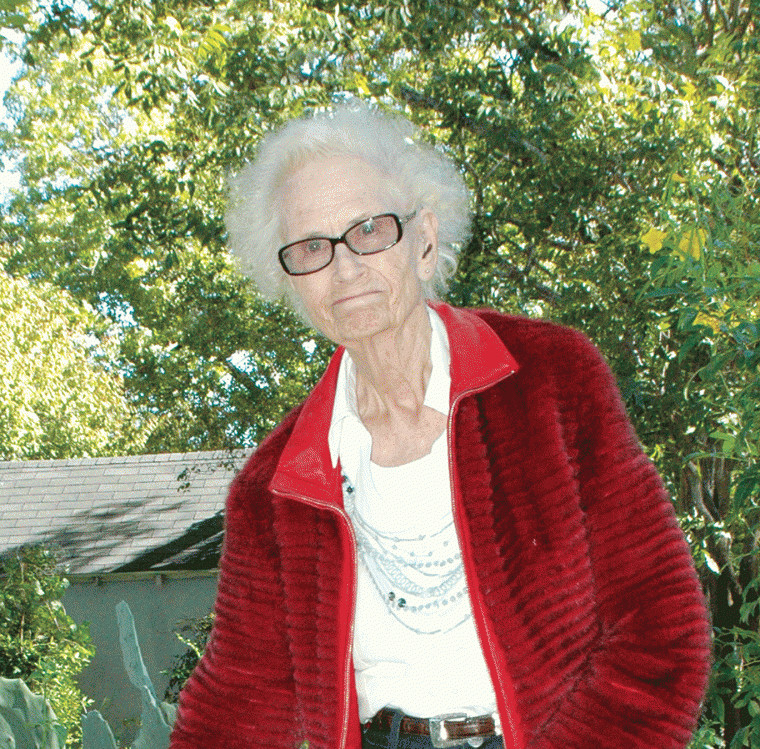DOROTHY PLOEGER: Secrets to success are stay active, have plans
Dorothy Ploeger’s life, 88 years long and counting while continuing to ride herd over a vast ranching empire, serves as a testament to what can be achieved following three simple recommendations.
“The secret, if there is one, is to stay active, be involved in something, have plans,” the Gonzales County business matriarch advises.
“Always have some plan out there [to carry out]. Then devise ways to implement that plan.
“I have one now. I have my plans of what I want to produce, I know how to do it, I’ve done a test project that was successful, I’ve got a marketing plan, all I have to do is get my stuff together and get started,” Dorothy confides.
“I’ve observed that many people who retire, if they don’t have something they’re interested in or something like that, they don’t live very long.”
To be sure, Dorothy is not one of those without something to do.
The mother of six children, grandmother of seven grandchildren and great-grandmother of five great-granddaughters, Dorothy also continues to operate two different ranches with her two sons, on which they raise Black Angus. Dorothy also owns and operates a ranch in Lavaca County with a young many who manages it.
She still has extensive cattle holdings, with registered Brahma cattle and a commercial herd. Dorothy says her goal for the commercial herd is to produce Braford (a cross between Brahma and Hereford breeds).
“She’s got cows in her blood,” her daughter, Sally, will tell you.
She has, however, “substantially reduced” the size of her herds in the aftermath of the past year’s drought, and is preparing for what experts are predicting to be an extended drought.
But her cattle interests come naturally.
Dorothy was born on her grandfather’s ranch in Lavaca County. “My grandfather took me to his heart. One of his cows had twin heifer calves not long after I was born, and he branded those for me. And ever after, every cow that had twin heifers, the heifer calves were branded for me. So, in a way, I’ve been in the cattle business all my life.”
But Dorothy’s career has not been limited to ranching. She served as a nursing home administrator in Cuero for a few years, and later in the same capacity in Yorktown on an interim basis.
She was chairman of the board of what was then Gonzales Bank, then “I got promoted or demoted” to president and chairman for two years. “I found out two valuable pieces of information: One was, I could do a good job, and the other was that I didn’t want to. It was interesting, but I got tired of sitting behind a desk. I like to be circulating around.”
She later filled in as president and chairman of the board at a bank in Cuero for about a year.
For 25 years, she was on the board of directors for the Gonzales Warm Springs Hospital, which was a rehabilitation hospital, and served as president as well as other board offices before stepping down.
When she stepped away from the business world, she immersed herself in service to community clubs, organizations and conservation projects.
Dorothy was the organizer and charter president of the Pilot Club of Gonzales, “which has been a great benefit to the community,” and continues as a privileged member. She served two separate terms as neighborhood chairman for the Girl Scouts, and was with the Master Gardeners in Victoria for 10 years before being named member emeritus, the only one to ever receive that status.
Among her latest interests are the Texas Prairie Wetlands Project, a conservation focus intended to improve the land and leave a legacy; two duck ponds for migratory fowl she recently built in collaboration with Ducks Unlimited; and planting improved grasses with plans to plant some native grasses.
With her wealth of experience and broad knowledge, Dorothy finds herself in a position similar to that of E.F. Hutton: When she talks, people listen.
“The first thing to consider is how she was going to capitalize her business,” she says in considering the kind of advice she would give a young woman embarking on a business career, pointing out that too many who start out in business abandon their plans at the first sign of trouble or fail to properly prioritize use of often-limited capital.
“I’d recommend that they don’t put too much of their capital into real estate, and keep most of their funds in working capital, unless they truly have an abundance of money,” she counsels.
“Service is the way you keep your customers if you run a business, whatever kind of business it is. Service is very important, and you should extend yourself to be helpful without assuming undue risk. There are many ways to be helpful.”
Comments







